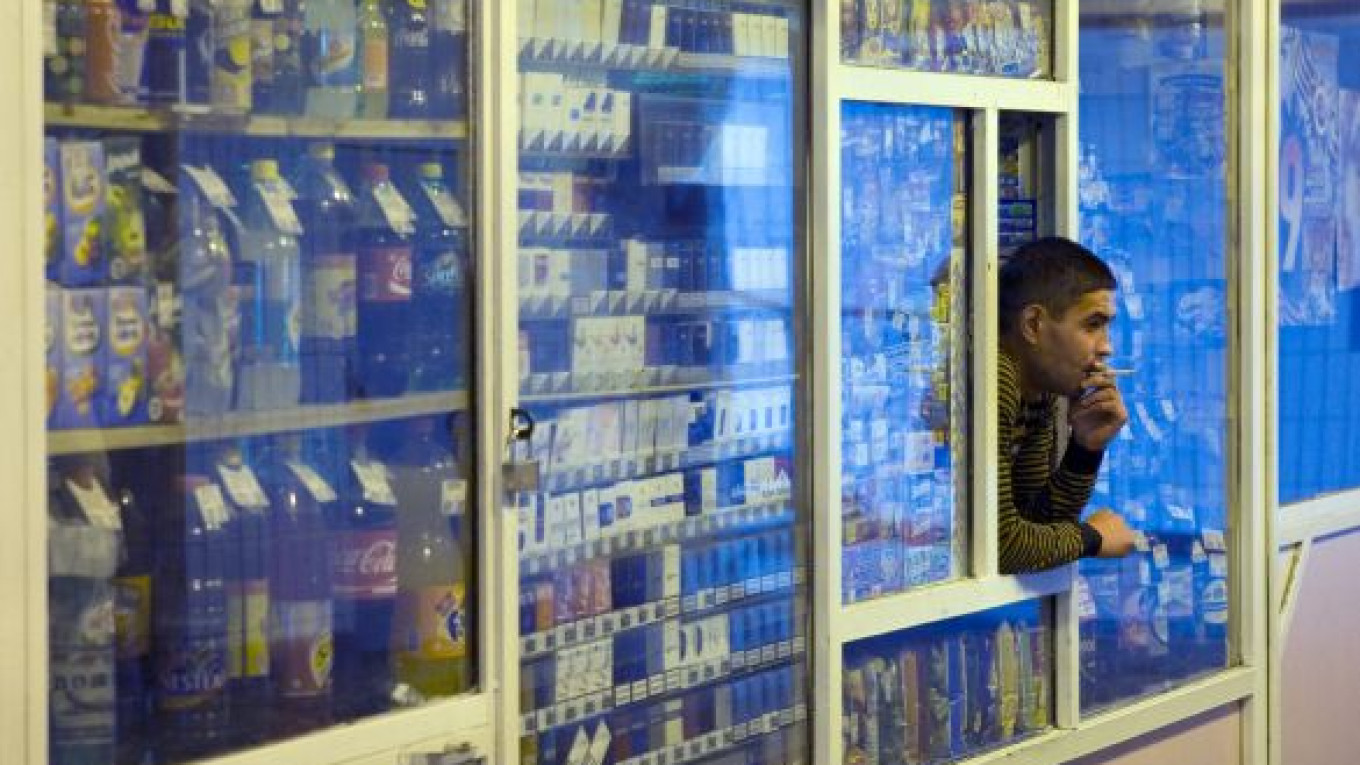The Coalition of Kiosk Owners said Wednesday that it would submit a 165,000-signature petition to President Vladimir Putin this week to halt pending bans on sales of cigarettes and beer.
A law passed last year forbids kiosks from selling beer as of Jan. 1. The Health and Social Development Ministry is now seeking to ban retail outlets with a floor area of less than 50 square meters from selling tobacco products.
The Coalition of Kiosk Owners, formed in April to fight the legislation, claims that such measures would shutter small businesses and not actually prevent drinking or smoking.
"Of course, we need to fight smoking. But this law would strike small business owners without having any impact on smokers," coalition leader Vladen Maximov said Wednesday.
"In St. Petersburg, where by law there are no kiosks, statistics show no discernible impact on rates of smoking," Maximov added.
Tobacco products can account for up to 70 percent of sales from kiosks in some regions, Maximov said. The coalition believes that a cigarette sales ban would push smokers to supermarkets and drive kiosks out of business.
The Economic Development Ministry has estimated that 300,000 to 500,000 kiosk workers could lose their jobs if the pending bans enter force.
The coalition estimates that firings could be closer to 1 million, including support positions like security guards and delivery drivers.
Maximov complained that officials "simply do not understand" the situation.
"They think we can just adapt and start selling different products, switch to sausages or whatever. They just don't understand the realities of how this business works," he said.
The coalition's written appeal argues that kiosks are a key stepping stone for many entrepreneurs to enter the business world and that such bans would have little if any impact on rates of smoking or drinking.
Maximov pointed to the experience of European countries that have taken an opposite route. In France, only small designated shops are allowed to sell tobacco. In Britain, a recently introduced ban on displaying tobacco products will not apply to smaller shops until 2015.
While Maximov was careful to say officials simply "do not understand" the impact of the changes, some kiosk owners have said the move is a deliberate attempt to clear their ubiquitous white-plastic boxes from Russia's streets for good.
The World Health Organization estimates that 39 percent of Russian adults are habitual smokers. Every year, 350,000 to 400,000 people die of tobacco-related diseases in the nation.
The World Health Organization has welcomed the health ministry's anti-tobacco legislation and warned that Big Tobacco would do all it could to dilute the measures.
Related articles:
A Message from The Moscow Times:
Dear readers,
We are facing unprecedented challenges. Russia's Prosecutor General's Office has designated The Moscow Times as an "undesirable" organization, criminalizing our work and putting our staff at risk of prosecution. This follows our earlier unjust labeling as a "foreign agent."
These actions are direct attempts to silence independent journalism in Russia. The authorities claim our work "discredits the decisions of the Russian leadership." We see things differently: we strive to provide accurate, unbiased reporting on Russia.
We, the journalists of The Moscow Times, refuse to be silenced. But to continue our work, we need your help.
Your support, no matter how small, makes a world of difference. If you can, please support us monthly starting from just $2. It's quick to set up, and every contribution makes a significant impact.
By supporting The Moscow Times, you're defending open, independent journalism in the face of repression. Thank you for standing with us.
Remind me later.


